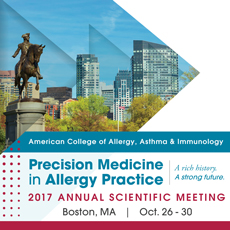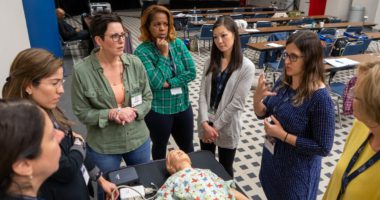 Food allergies have been in the headlines all year. It began when the National Institute of Allergy and Infectious Diseases announced new guidelines for introducing peanut-containing products to high, moderate and low-risk infants to prevent peanut allergy. Ten months later, many parents are still confused about the guidelines, and are probably coming to you for answers. That’s just the first glance when it comes to food allergy as a hot topic. The College Annual Scientific Meeting Oct. 26-30 in Boston has a lot of answers, and will provide the information you need to be the go-to resource for your patients.
Food allergies have been in the headlines all year. It began when the National Institute of Allergy and Infectious Diseases announced new guidelines for introducing peanut-containing products to high, moderate and low-risk infants to prevent peanut allergy. Ten months later, many parents are still confused about the guidelines, and are probably coming to you for answers. That’s just the first glance when it comes to food allergy as a hot topic. The College Annual Scientific Meeting Oct. 26-30 in Boston has a lot of answers, and will provide the information you need to be the go-to resource for your patients.
“This year’s program will deliver cutting edge, clinically relevant content regarding food allergy,” says Matthew Greenhawt, MD, FACAAI, chair of the ACAAI Food Allergy Committee. “The sessions at this year’s meeting run the gamut from emerging therapeutics, the nuts and bolts of primary food allergy prevention and how to implement prevention guidelines in the office. We’ll examine updates on how to optimally perform a food challenge, and tools to better determine which of our food allergic patients are at greatest risk. Our speakers – among the best in the US in these areas – will provide their unique guidance and thoughts on these issues. It’s a topic area attendees do not want to miss!”
If you haven’t already registered for the Annual Meeting, it’s not too late. Here are the sessions you’ll be able to attend:
- New Horizons in Food Allergy, Oct. 26 – A half-day session on Thursday will explore new treatments that may be approved by the FDA for food allergy in the near future, as well as the latest techniques in prevention of food allergy. Topics will include:
- Oral Immunotherapy
- Epicutaneous Immunotherapy
- Other Approaches to Treatment
- Mechanisms of Food Allergy (Development and Treatment)
- Non-IgE Mediated Food Allergy
- Prevention of Food Allergy
- Epidemiology of Food Allergy
- FARE: Update on Clinical Network and Tools
- Going Nuts: The Complexities of Diagnosis and Management in Nut Allergy Patients, Oct. 27 – An interactive, case-based workshop reviewing the utility of SPT, IgE, component testing, OFCs and interpretation of results with consideration of cross-reactivities and co-sensitization. This workshop is sold out. To get on the wait list email registration@acaai.org.
- Demystifying Early Introduction of Food to Prevent Food Allergy, Oct 28 – This plenary session will discuss practical recommendations for implementing the new NIAID guidelines on early introduction of foods to prevent allergy.
- FPIES, EoE and Other GI Disorders: Gastroenterology and Allergy Viewpoint, Oct. 28 – Review common non-IgE-mediated food allergen conditions with gastrointestinal manifestations, including food protein induced enterocolitis syndrome (FPIES) and eosinophilic esophagitis (EoE).
- Can We Predict Severity Risk for Food Allergy?, Oct. 29 – Find out more about the biological and behavioral factors that may influence the risk for severe reactions and the evolution of the risk factors for developing allergy.
- Food Challenges in Practice: Safe and Simplified, Oct. 30 – Explore methods of food challenge tests and the advantages and limitations of each, along with discussion of the preparation, administration and implementation of the oral food challenge results and specific issues in infants and adults.


